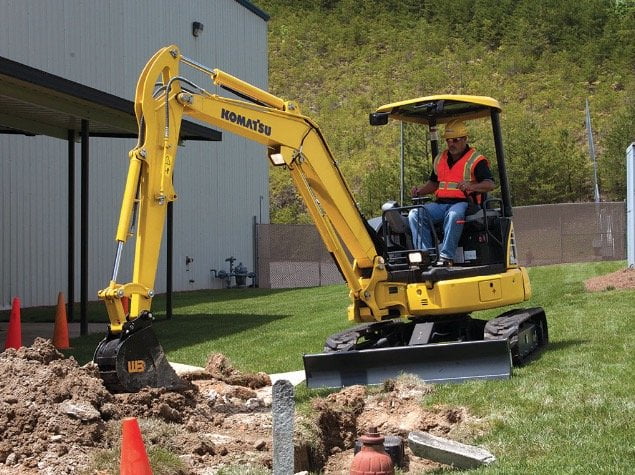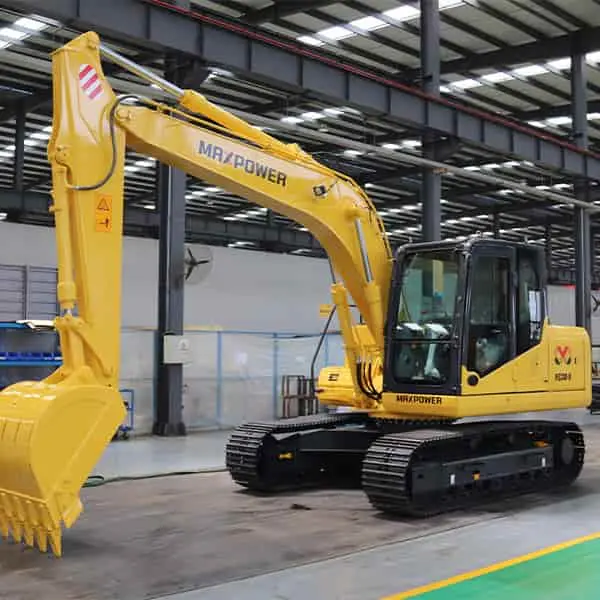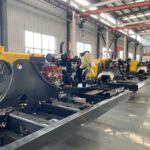Introdução
In the construction industry, efficiency is paramount. With tight deadlines and demanding projects, selecting the right excavating equipment is crucial for maximizing productivity and minimizing downtime. Excavators, also known as backhoes, are versatile machines that play a central role in various excavation tasks, from digging trenches to loading trucks.
Types of Excavators

The world of excavators offers a variety of options to suit diverse excavation requirements. Here are the main types of excavators:
- Track Excavators: Track excavators, also known as crawler excavators, are renowned for their stability and traction on uneven terrain. They are ideal for soft or muddy ground and are often used in large-scale excavation projects.
- Wheel Excavators: Wheel excavators, also known as mobile excavators, offer superior maneuverability and transportability due to their rubber tires. They are well-suited for paved surfaces and frequent job site changes.
- Mini Excavators: Mini excavators, also known as compact excavators, are smaller and lighter than traditional excavators, making them ideal for confined spaces and delicate tasks. They are particularly useful in landscaping, utility work, and interior demolition.
- Draglines: Draglines are specialized excavators equipped with a long cable and bucket that are used for dredging, digging underwater, and reaching over obstacles.
Factors to Consider When Selecting Excavating Equipment

Choosing the right excavator for your project involves carefully considering several factors:
- Job Site Conditions: Assess the terrain, soil type, and accessibility of the job site to determine the most suitable excavator type (crawler, wheel, or mini).
- Excavation Depth and Reach: Evaluate the required digging depth and reach to ensure the excavator’s arm and bucket can handle the task effectively.
- Excavation Volume: Determine the estimated volume of material to be excavated to select an excavator with the appropriate bucket capacity and lifting capacity.
- Transportation Needs: Consider the distance between job sites and the ease of transporting the excavator if frequent relocation is required.
- Operator Experience and Preference: Factor in the operator’s experience level and preferences when choosing between different excavator controls and cab designs.
Entendimento Excavating Equipment
Excavating equipment encompasses a wide range of machinery designed for earthmoving and excavation tasks. From compact mini excavators to heavy-duty hydraulic excavators, each type of equipment serves specific purposes based on the scale and nature of the project. Here’s an overview of some common types of excavating equipment:
Mini Excavators: Compact and versatile, mini excavators are ideal for small-scale projects and tight spaces. They excel at tasks such as digging trenches, landscaping, and demolition.Mini excavators are also easy to transport from one job site to another, making them a convenient choice for contractors and homeowners alike. With various attachments available, these machines can tackle a wide range of jobs with precision and efficiency. Whether you’re working on a residential backyard or a commercial construction site, a mini excavator is a valuable tool to have in your equipment fleet.
Hydraulic Excavators: Hydraulic excavators are powerful machines equipped with hydraulic systems for enhanced digging force and precision. They are commonly used in large-scale construction projects for digging, lifting, and loading tasks.
Backhoe Loaders: Combining the capabilities of a loader and a backhoe, backhoe loaders are versatile machines suitable for various tasks, including digging, trenching, and material handling.Backhoe loaders are commonly used in construction, agriculture, and landscaping due to their compact size and ability to perform multiple functions.
Bulldozers: Bulldozers are heavy-duty machines equipped with a wide blade at the front for pushing soil, debris, or other materials. They are commonly used for site clearing, grading, and leveling.
Table: Summary of Excavator Types and Applications
| Excavator Type | Applications |
|---|---|
| Track Excavators | Large-scale excavation projects, soft or muddy terrain |
| Wheel Excavators | Paved surfaces, frequent job site changes |
| Mini Excavators | Confined spaces, delicate tasks, landscaping, utility work, interior demolition |
| Draglines | Dredging, digging underwater, reaching over obstacles |
Conclusão: Excavating Equipment
Selecting the right excavating equipment is a crucial decision that can significantly impact project efficiency and productivity. By carefully considering the job site conditions, excavation requirements, transportation needs, operator preferences, and available budget, you can make an informed choice that ensures optimal performance and value for your construction project.
Perguntas frequentes
What is the most versatile type of excavating equipment?
- Hydraulic excavators are considered the most versatile due to their wide range of applications and adaptability to different terrains.
Can crawler excavators be used in urban construction projects?
- While crawler excavators are designed for heavy-duty work, they can be used in urban construction projects, but wheel excavators or backhoe loaders may be more suitable due to their mobility and compactness.
How important is the skill level of the operator when selecting excavating equipment?
- The operator’s skill level is very important. Some machines are more complex to operate than others, and choosing equipment that matches the skill level of your team can prevent accidents and ensure efficient operation.
What are the maintenance requirements for different types of excavating equipment?
- Maintenance requirements vary by type. Hydraulic and crawler excavators typically require more maintenance due to their complexity, while backhoe loaders and mini excavators are generally easier to maintain.
Are mini excavators suitable for large-scale projects?
- Mini excavators are best suited for small-scale projects and tight spaces. For large-scale projects, hydraulic or crawler excavators are more appropriate due to their power and versatility.






-150x150.webp)
